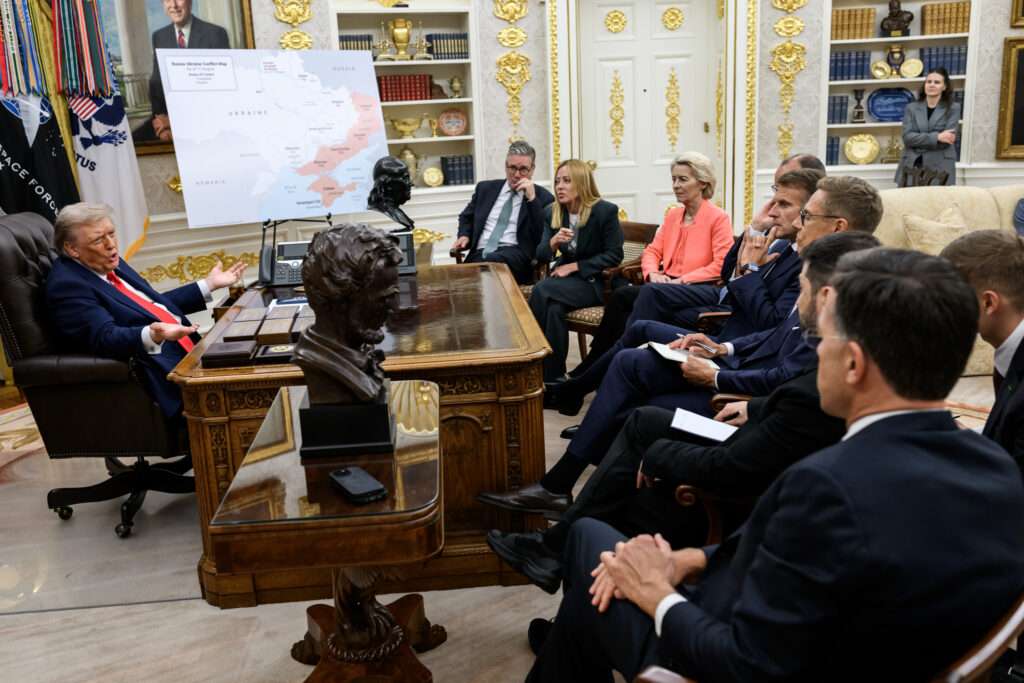Mamdani Understands Something About Trump That European Leaders Don't
Trump respects outreach from opponents more than submissive flattery from friends.

The spectacle of last week was the meeting between President Donald Trump and New York Mayor-elect Zohran Mamdani, two politicians been going after each other for months. Trump, who had called Mamdani a "communist lunatic" during the mayoral election, now declared Mamdani "a very rational person." When journalists asked Mamdani about his past attacks on Trump's "fascist agenda," the president beamed, patted Mamdani, and added, "That's OK. You can just say it."
In some ways, the encounter resembled Trump's meeting with the new Syrian president, Ahmad al-Sharaa, in May 2025. "Young, attractive guy. Tough guy. Strong past. Very strong past. Fighter," Trump said of al-Sharaa, former head of Al Qaeda in Syria. It was also a throwback to Trump's first-term outreach to North Korea. After threatening the country with "fire and fury," he had a series of meetings with its leader, Kim Jong Un, whom Trump came to praise as a "very honorable" negotiating partner.
Other leaders often take Trump as a sucker for flattery. Since he's apparently willing to bury the hatchet with a few kind words, the thinking goes, those words must be the secret to appeasing him. It rarely works, because Trump is good at smelling weakness. But he respects strength. Trump accepts outreach from former enemies—domestic opponents or foreign warlords—because he enjoys the feeling that he has tamed a dangerous beast.
With Trump, "flattery is ultimately counter-productive. In the short term, it avoids a public clash and may even help limit punishment in the form of tariffs or public criticism. In the longer term, far from buying respect, it earns his disdain and encourages the assumption that allies will cave on policy," former Biden administration official Philip Gordon wrote in the Financial Times last week.
Perhaps nothing has illustrated this principle better than Trump's relationship with Europe. In a bid to keep American military aid to Ukraine flowing, European leaders have practiced their best flattery skills. In June 2025, North Atlantic Treaty Organization Secretary General Mark Rutte creepily called Trump "Daddy." In August 2025, a group of European leaders crowded around Trump's desk while he reclined in his chair, like supplicants before a king.

Humiliation begets humiliation. Over and over again, Trump has insulted Europe and made it clear that negotiations for the future of Ukraine will happen over the Europeans' heads. He has demanded a cut from Ukraine's natural resources and pushed the European Union to take a lopsided trade deal that puts tariffs on European products while exempting American ones.
Other allies have tried, and failed with, the same approach. Asian leaders showered Trump with praise and gifts during his last visit to the region. Japanese Prime Minister Sanae Takaichi promised to nominate him for the Nobel Peace Prize, and South Korean President Lee Jang Myung gave Trump a literal golden crown. That didn't stop Trump from tariffing Japan into an economic contraction and extracting a $350 billion ransom from South Korea to avoid the same fate.
Contrast that with Mexico and Canada, two small countries in America's shadow. Early in his second term, Trump announced blanket tariffs against both of them. He accused Mexican President Claudia Sheinbaum of allying with gangsters and even threatened to annex Canada. Rather than trying to appease the U.S. president, Mexico and Canada immediately hit back with tariffs of their own. Ontario, the province of Canada with the most to lose, struck a daredevil tone.
"If they want to try to annihilate Ontario, I will do anything, including cutting off their energy—with a smile on my face," Ontario Premier Doug Ford said at a press conference. "They need to feel the pain."
Trump ended up softening and delaying the tariff increases on Mexico and Canada. Just this weekend, he blew through a self-imposed deadline to tariff Canada, which Trump had announced in retaliation for Ford taking out an anti-tariff ad. And he hasn't followed through on his threats to expand the drug war by bombing Mexico. Sheinbaum, a left-wing leader who has declared that Mexicans will "never bow our heads" to America, enjoys a strangely warm relationship with Trump.
"You're tough," Trump told Sheinbaum during a private March 2025 phone call, adding in public that he would suspend tariffs "out of respect" for his "very good" relationship with Sheinbaum.
Mamdani, who has threatened to block Immigration and Customs Enforcement raids and arrest Israeli Prime Minister Benjamin Netanyahu, clearly benefited from the same respect for strength. Despite the huge leverage that the federal government holds over New York City, the mayor-elect came out swinging. He promised in his victory speech to be "Trump's worst nightmare" and "show a nation betrayed by Donald Trump how to defeat him."
It looked a lot more serious than Trump's other domestic opposition. At the beginning of the second Trump administration, House Minority Leader Hakeem Jeffries (D–N.Y.) had whimpered, "It's their government. What leverage do we have?" The same week that Mamdani was readying his followers for confrontation, Senate Minority Leader Chuck Schumer (D–N.Y.) was surrendering to Republicans on the government shutdown while begging them to see the light of reason. So it shouldn't be much of a surprise that Trump treated Mamdani as an equal and heaped contempt on Schumer.
Of course, personal respect from Trump is not enough to totally derail a hostile agenda. Mexico and Canada still suffered from some tariff increases. And the risk of bluster is having to back it up. Mamdani and Trump still have substantive, zero-sum disagreements that will force them to fight.
But even if resistance has its downsides, grovelling clearly does not work. European and Asian leaders have thrown away a strong hand by preemptively signalling their intent to surrender. Mexico and Canada's leaders avoided the worst outcome by playing a weak hand with strength. In a palace full of sycophants, the way to win the king's respect is with defiance.
